|
Limitar tu búsqueda
[+–] Compilador o editor
- Abrantes Pêgo, Raquel (2)
- Aguilera, Nelly (6)
- Anguiano Cárdenas, Rosa del Cármen (1)
- Castaleda Zainos, Marcos (1)
- Del Valle Muñoz, Alejandro (1)
- Durán, Luis (4)
- García Castelán, Alfonso (1)
- Garro, Nora (1)
- Giles Valdés, Rafael (1)
- González Rojas, Bertha Alicia (1)
- Hernández Sánchez, José Antonio (1)
- Linares Tirado, Rebeca (1)
- Martínez, Gabriel (3)
- Matute de Díaz, Zoila (1)
- Meléndez, Jorge (1)
- Méndez Suazo, Elmer (1)
- Palmero Zilveti, Olga (2)
- Ponce Aguilar, Luisa (1)
- Reyes Godelmann, Iker (1)
- Suárez, Rosa María (1)
- Valencia, Anel (1)
[+–] Editorial
[+–] Fecha
[+–] Formato
[+–] Idioma
[+–] Tipo de documento
[+–] Tipo de recurso
[+–] Classification
|

|
|
Evolución de los cambios en el acceso a servicios financieros de los hogares en México
En marzo de 2004, BANSEFI y SAGARPA iniciaron un proyecto para examinar el impacto en los hogares del Programa de Fortalecimiento del Sector de Ahorro y Crédito Popular), el cual fue diseñado para ayudar a los intermediarios financieros no bancarios a acatar la Ley de Ahorro y Crédito Popular (LACP), aprobada por el Congreso Mexicano en 2001. Durante la primavera de 2004, se realizó una encuesta...
|
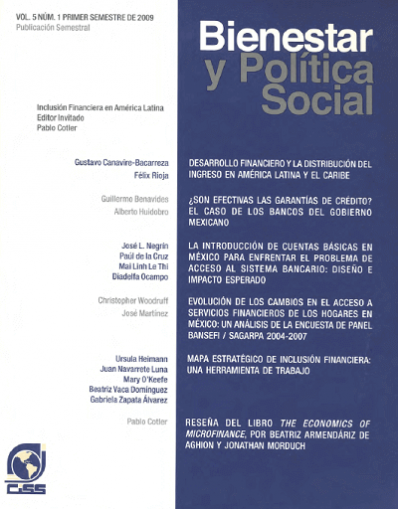
|
|
|
|

|
|
La introducción de cuentas básicas en México para enfrentar el problema de acceso al sistema bancario: diseño e impacto esperado
Este artículo presenta la experiencia mexicana en la introducción de cuentas de transacciones básicas. Las cuentas básicas son productos bancarios con funcionalidad restringida, relativamente baratos y sencillos, dirigidos a grupos sociales que tienen un acceso limitado a cuentas de transacciones. En el caso de México se introdujeron cuentas básicas de nómina y para el público en general. Por ley...
|
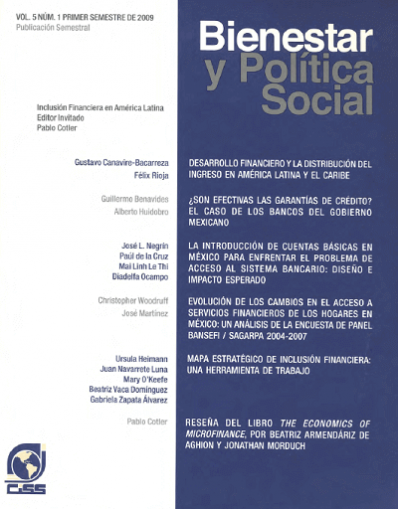
|
|
|
|

|
|
¿Son efectivas las garantías de crédito? El caso de los bancos del gobierno mexicano
Los Bancos del Gobierno Mexicano ofrecen garantías de crédito a bancos privados a fin de estimular el crédito dirigido a empresas pequeñas y medianas no financieras y esta política se examina en este artículo. La aplicación de datos representativos al análisis de estática comparativa de la decisión de uso de garantías sugiere que, como están diseñadas actualmente, son justificables desde un punto...
|
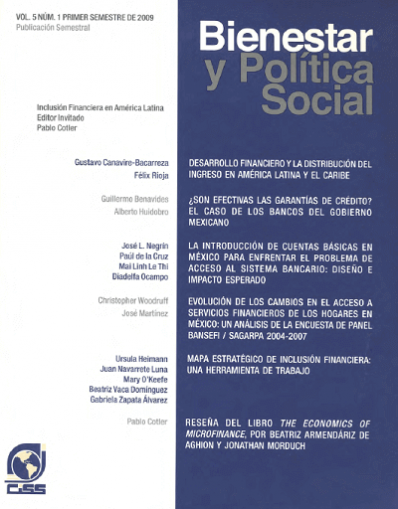
|
|
|
|

|
|
Desarrollo financiero y la distribución del ingreso en América Latina y el Caribe
Uno de los intereses centrales en América Latina y el Caribe (ALC) ha sido la reducción de la pobreza y la desigualdad tan predominante en el continente. Al usar muestras mundiales grandes, la literatura ha encontrado que el desarrollo financiero aumenta el crecimiento económico, aumenta los ingresos de los pobres y reduce la desigualdad. Este documento estudia los efectos del desarrollo...
|
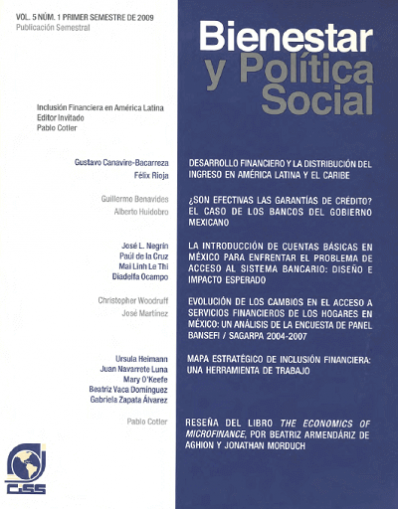
|
|
|
|

|
|
Reseña del libro Beyond survival. Protecting households from health shocks in Latin America, por Baeza, Cristian C., y Truman G. Packard
El libro de Cristian Baeza y Truman Packard se basa en la siguiente hipótesis: los problemas de salud reducen el consumo de bienes y servicios distintos a los servicios de salud, y muchos hogares empobrecen debido a esto. Aunque los autores reconocen que la evidencia que presentan al respecto es limitada, proponen el uso de un “fondo universal de riesgos” como una forma de eliminar el problema de...
|
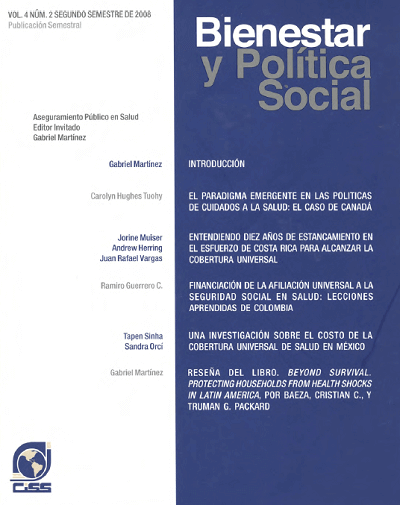
|
|
|
|

|
|
Las pensiones de la seguridad social y las decisiones de retiro en México
Con información por cohorte para el periodo 1991-2000, este artículo estudia la relación que existe entre la decisión de retirarse —la transición de la actividad a la inactividad laboral— y las pensiones (contributivas) de la seguridad social, en países menos desarrollados. La extensa serie de datos disponible permite también analizar la forma en la cual la crisis financiera de 1995 afecta los...
|
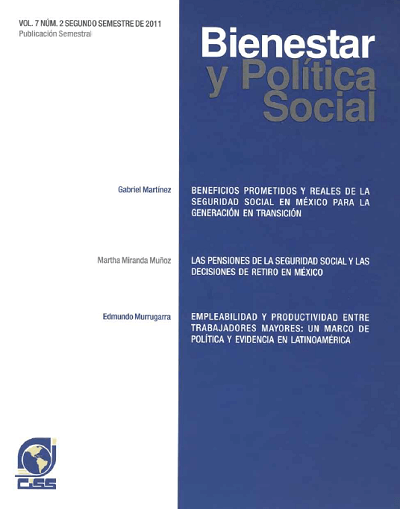
|
|
|
|

|
|
Determinantes y desigualdades socioeconómicas en las condiciones de desnutrición infantil de Sri Lanka
A pesar de los múltiples esfuerzos por mitigar la desnutrición que se han realizado a través de los años, ésta afecta a cientos de miles de niños en Sri Lanka. Es de vital importancia entender los factores determinantes y las desigualdades socioeconómicas en las condiciones de desnutrición para poder concentrar la ayuda en grupos socioeconómicos específicos con objeto de mejorar su estado de...
|
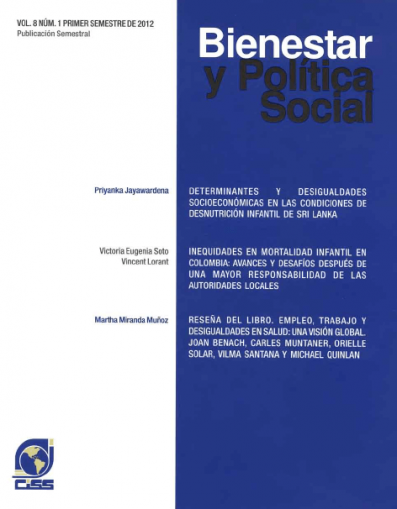
|
|
|
|

|
|
Book review. Violence and social orders: a conceptual framework for interpreting recorded human history, by Douglas C. North, John Joseph Wallis, and Barry R. Weingast
Why societies differ in their level of violence? This is the question addressed by North, Wallis, and Weingast. To provide an answer they must develop a rich theory of how individuals and organizations that compose a human group voluntarily surrender their will to act violently in exchange for participating in a society with improved conditions for the creation and conservation of wealth.
|
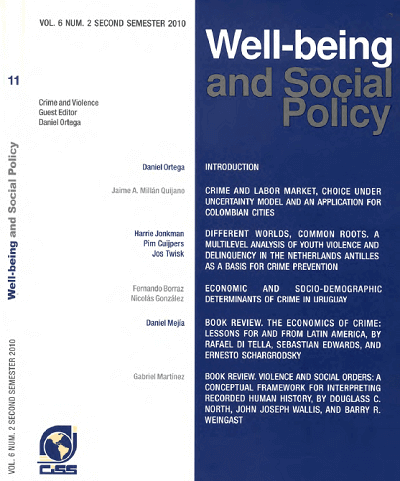
|
|
|
|

|
|
Programas de pensiones, empleo y familia
Los programas de pensiones, empleo y familia constituyen tres de las cuatro grandes categorías de la política social (la cuarta siendo los de salud). En este artículo se analizan opciones para su diseño dentro de un marco de universalidad de la seguridad social en México. Si bien estos programas tienen componentes de beneficios monetarios centrales, también requieren de estrategias sólidas y...
|
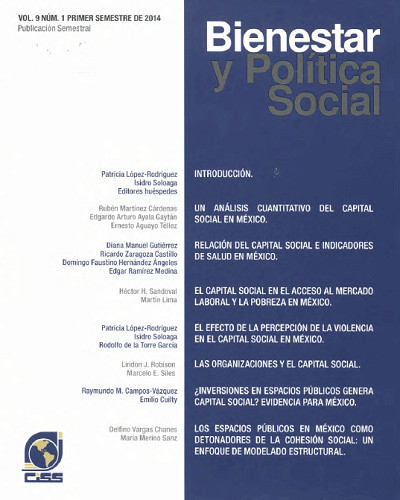
|
|
|
|

|
|
Book review. The economics of crime: lessons for and from Latina America, by Rafael Di Tella, Sebastian Edwards, and Ernesto Schargrodsky
The Economics of Crime: Lessons for and from Latin America makes an important contribution to the study of crime and violence in Latin America and to the debate about what works for reducing crime (and at what cost?). As the title of the book correctly suggests, the book brings together contributions from Latin American economists on the determinants and consequences of crime, as well as...
|
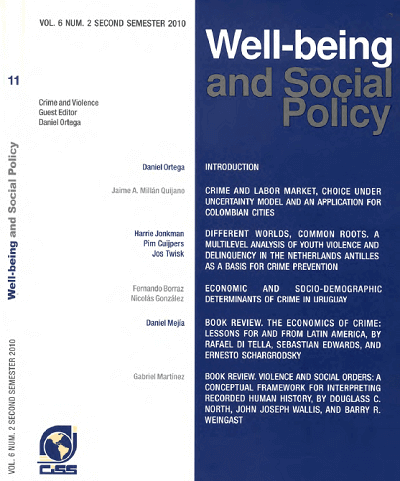
|
|
|
|

|
|
Economic and socio-demographic determinants of crime in Uruguay
This study estimates a panel data model to analyze the economic and socio-demographic determinants of crime in Uruguay across the 19 Uruguayan departments in the period 1986-2006.
This research has two components: i) to present a systematic analysis of the Uruguayan crime data and socio-economic and demographic characteristics of the population, and ii) to evaluate the empirical significance...
|
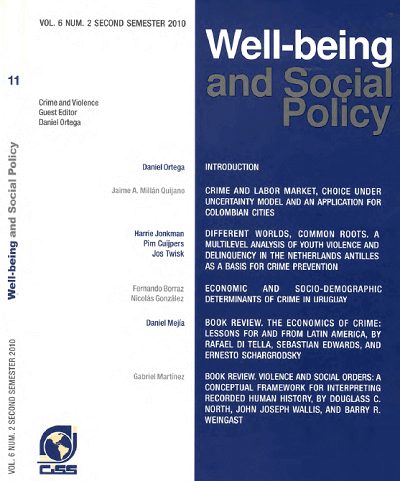
|
|
|
|

|
|
Different worlds, common roots a multilevel analysis of youth violence and delinquency in the netherlands antilles as a basis for crime prevention
Most research on the prevalence, determinants, and variations of violence and delinquency among youngsters is conducted in Western societies. This multilevel study is set in the Netherlands Antilles (NA) and aims to build up prognostic multilevel models as a basis for targeted crime prevention in a non-western area. Data were collected from a sample of adolescente in the NA. Non-hierarchical and...
|
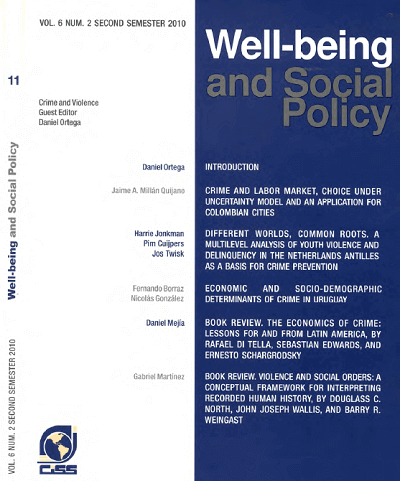
|
|
|
|

|
|
Crime and labor market, choice under uncertainty model and an application for colombian cities
Este trabajo ofrece un modelo para determinar la función de oferta del crimen con base en la teoría de la elección en condiciones de incertidumbre. Con base en el problema de un agente que maximiza su utilidad sujeto a las restricciones del mercado legal e ilegal, este estudio intenta explicar la oferta de la delincuencia como función de la distribución de los salarios y el equivalente cierto de...
|
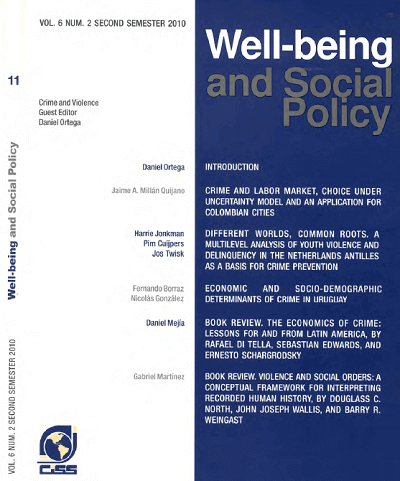
|
|
|
|

|
|
Introduction (On the studies presented at the International Conference on "Delinquency and Violence in Latin America and the Caribbean")
Crime has become the leading concern for citizens of the region and has been pushed to the forefront of the international policy agenda; what is more, the combination of very few success stories and abundant failures in curbing crime and violence has underscored how thin our understanding is and the difficulty of designing and implementing an effective strategy at the local level. This issue...
|
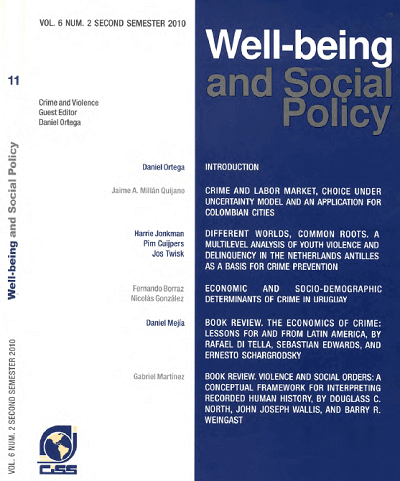
|
|
|
|

|
|
An investigation into the cost of universal health coverage in Mexico
The Mexican social security system, after operating for over six decades, has managed to provide healthcare for slightly over half the resident population.
There are wide geographical and socioeconomic variations in coverage. To provide wider coverage, the Federal Government created the Sistema de Protección Social en Salud (SPSS) for covering low income family. It becomes the third...
|
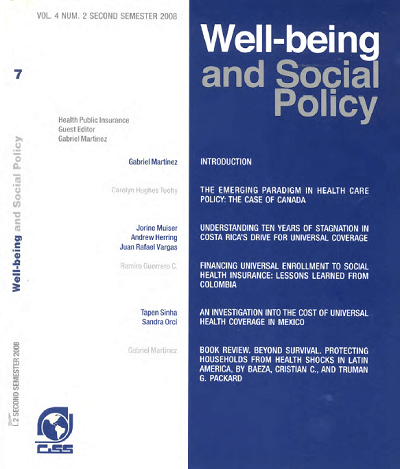
|
|
|
|

|
|
Is international migration a substitute for social security
The focus on short-term macroeconomic factors, including unemployment and wages, is insufficient to explain international migration. Institutional factors, bound to change only in the long run, can potentially have a large impact on migration flows. To illustrate this, we analyze Mexico-U.S. migration focusing on social security coverage, an important indicator of job formality. Using...
|
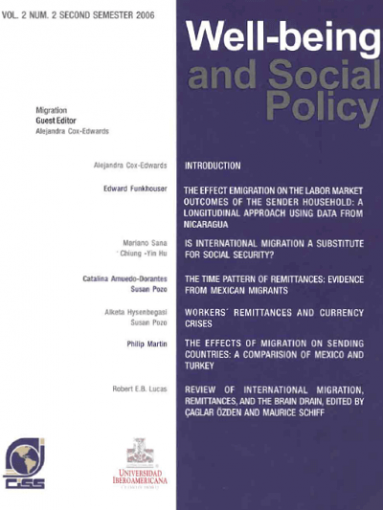
|
|
|
|

|
|
The effect of migration on the labor market outcomes of the sender household: a longitudinal approach using data from Nicaragua
In this paper, I use longitudinal data from the 1998 and 2001 Living Standard Measurement Surveys in Nicaragua to examine the impact of the emigration of household members on the household labor market integration and poverty. The main findings of the paper are that households from which an emigrant left had a reduction in members, a reduction in working members, a reduction in labor income than...
|
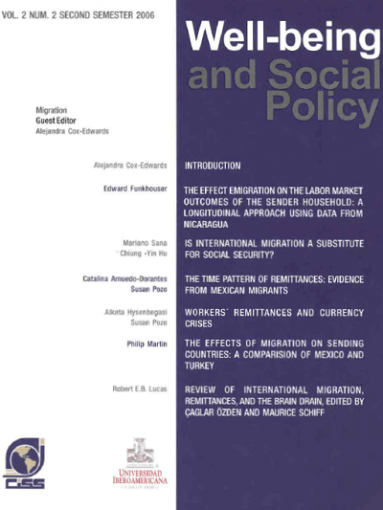
|
|
|
|

|
|
Family health expanditure and demand: an analysis based on the consumer expenditure survey - POF - 2002/2003
This paper aims at analyzing healthcare expenditure and demand of families, by estimating income-elasticity and price-elasticity for ten groups of products using the so-called model Linear Almost Ideal Demand System (LAIDS). The 2002/03 consumer expenditure surveys (POF) of the Fundação Instituto Brasileiro de Geografia e Estatística – FIBGE (Brazilian census bureau) are used, providing extremely...
|
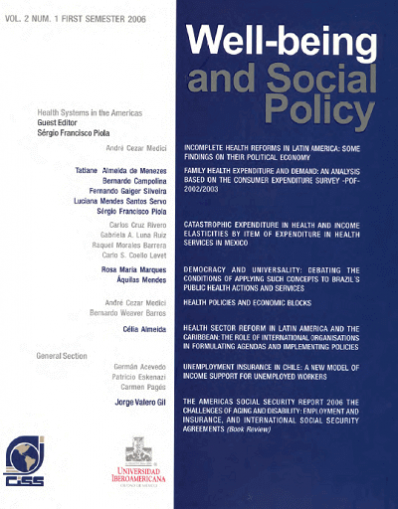
|
|
|
|

|
|
Incomplete health reforms in Latin America: some findings on their political economy
This paper raises the point that only few health reforms implemented in Latin American countries modified the existing health systems in order to fix the problems brought by the institutional fragmentation typical of this sector. A great part of these reforms did not implemented the necessary measures to improve coordination among health systems in the prevailing pluralistic model and besides,...
|
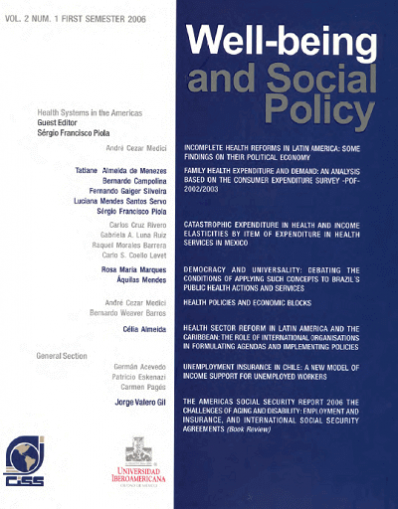
|
|
|
|

|
|
The Americas Social Security Report 2005: labor markets and the fragmentation of social insurance, financing for HIV-AIDS by social security (Book review)
The Americas Social Security Report 2005, published by the CISS, gathers the contributions, opinions, and comments of more than 30 social security specialists from different countries in the American continent, as well as the review of the most recent literature on this matter. The purpose is to present, to specialized public and to laymen, a detailed, analytic, and updated report of the...
|
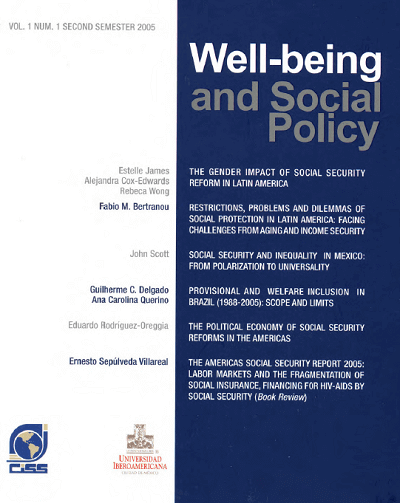
|
|
|
|
|